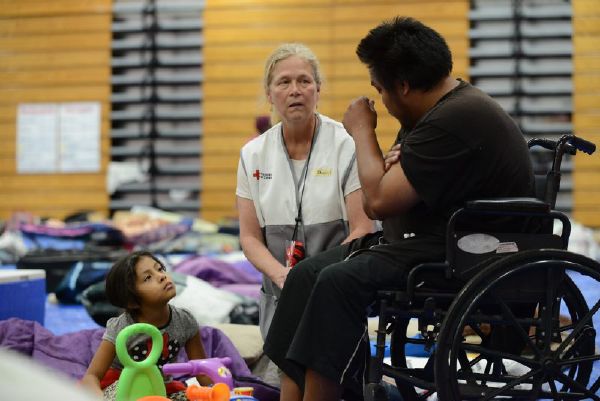Hurricane season began on June 1 for the area watched over by the National Hurricane Center. For people living along the coast, as I do, it’s time to plan for moving quickly. For people with mobility problems planning is essential since, as you know, moving quickly isn’t something that we do.
I wrote about this last November, but it’s time to review some updated tips and suggestions. They’re good for a variety of disasters. Fires, floods, industrial accidents, and other incidents can all result in the need to hurry-up-and-go.
Stay or go?
In Florida, where they know a thing or two about disasters, the state’s emergency management website says “your unique circumstances and the nature of the emergency should be carefully evaluated before either option is decided upon. As a person with disabilities/special needs or a caretaker of individuals with special needs, your disaster plan should consider, and have options for both situations.” But, if you decide to go you’d better have a good plan for where you’re going.
Evacuation shelters
The American Red Cross is one of the disaster agencies that sets up evacuation
centers. When a person with a disability comes to a Red Cross shelter, a worker

will speak with them about their specific needs and how they can help. That help can include assisting a person to move between a wheelchair and a cot, cutting food, and navigating a cafeteria-style food service line. In many shelters, items such as shower stools, commode chairs, and a variety of cots can be provided.
In Florida, and perhaps in some other states, some shelters are specifically designed for people with special needs. They provide safe housing for people who need extra help because of a medical condition, or who need special supervision by a healthcare professional. But you can’t just show up at a special needs shelter. In Florida, registration is required before an emergency happens, and a person with a disability must meet certain eligibility requirements to be admitted. Those requirements can differ in various counties in the state. So, your plan should include contacting emergency management officials in your state and county before a disaster hits to see of registration applies to you.
Things to bring with you
According to the Red Cross, evacuation shelters are typically only meant to house people for 12 to 24 hours until the storm or other disaster moves through. These shelters may not have enough supplies to provide a cot and blanket for each person, so shelter planners recommend you bring the following items with you if you can:
- Bedding (sleeping bag)
- Clothing (for several days)
- Medications and copies of prescriptions
- Your child’s stuffed animal, blanket, or other “lovey”
- Your emergency kit (recommendations can be found on the Red Cross website).
Don’t Bring:
- Alcoholic beverages
- Illegal drugs
- Weapons
- Pets (unless you’re going to a pet shelter)
In longer-term shelters, you may find more robust services, such as warm meals and a place to shower, but don’t expect these in a shelter that’s been set up quickly for a stay of a day or two.
Special items for mobility
Here are some edited recommendations from the Ready.gov website:
- If you use a power wheelchair, try to have a lightweight, manual chair available as a backup. Know the size and weight of your wheelchair in addition to whether or not it is collapsible, in case it has to be transported.
- Show others how to operate your wheelchair.
- Buy an extra battery for your power wheelchair or scooter and keep it charged.
- Consider keeping a patch kit or a can of sealant for flat tires, if your tires are inflatable.
- Keep an extra cane or walker, if you use one.
- If you use a seat cushion to protect your skin or maintain your balance, and you must evacuate without your wheelchair, take your cushion.
Plan for disasters now
Nobody knows your needs better than you do. And now, when the sun is shining, is the time to make sure you can meet your needs if disaster lands on your doorstep.
(Featured photo: September 14, 2017. Collier County, Florida.
American Red Cross shelters Immokalee residents after Hurricane Irma destroyed most of their town. Photo by Daniel Cima for the American Red Cross).
(A version of this post appeared as my column on the Multiple Sclerosis News Today website).



